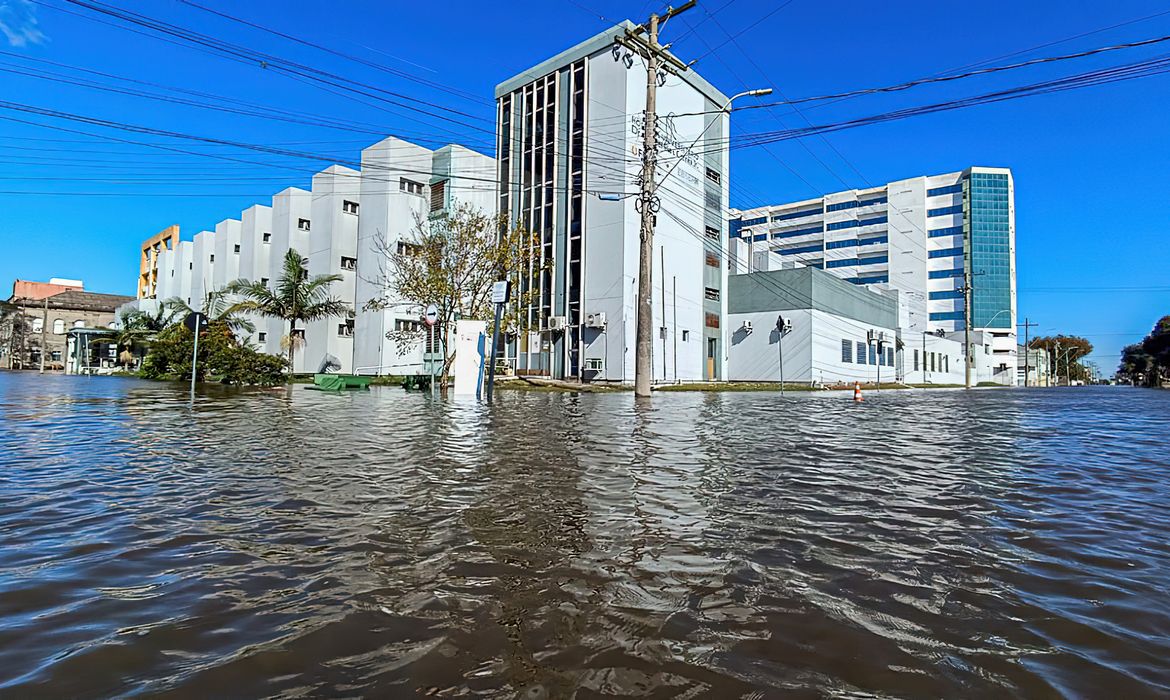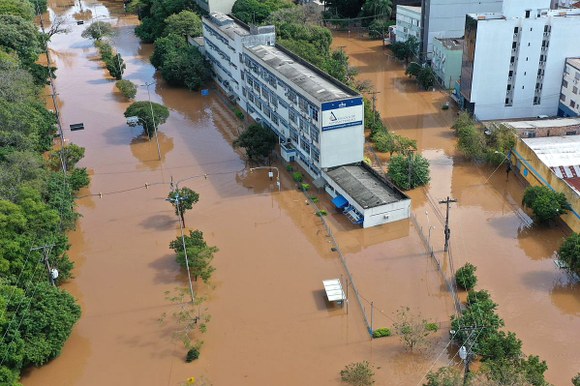 #News
#News
How Rio Grande do Sul floods are affecting science
The climate catastrophe has interrupted clinical trials and research; many Brazilian institutions were flooded or converted into temporary shelters
 The Dr. Miguel Riet Corrêa Jr University Hospital at the Federal University of Rio Grande (FURG), Rio Grande do Sul, was forced to close its doors to patients due to the rising water level of the Lagoa dos Patos lagoon | Photograph: MS/Divulgação
The Dr. Miguel Riet Corrêa Jr University Hospital at the Federal University of Rio Grande (FURG), Rio Grande do Sul, was forced to close its doors to patients due to the rising water level of the Lagoa dos Patos lagoon | Photograph: MS/Divulgação
In addition to the social, economic, and environmental impacts, the floods that recently devastated Rio Grande do Sul have also affected teaching and research activities in the state. The Brazilian Association of Directors of Federal Higher Education Institutions (Andifes) predicts that universities in Rio Grande do Sul will only resume normal functioning at the end of the year.
Many higher education institutions were flooded, closed, or transformed into shelters for the homeless and displaced.
The ground floor of the Business School at the Federal University of Rio Grande do Sul (UFRGS), located in the center of Porto Alegre, the state capital, was completely inundated by the waters of Lake Guaíba, resulting in the loss of books, equipment, and furniture. The university is still assessing the damage to the building’s electrics. Classes have been suspended since May 1, and there is not yet any timeline on when they will be resumed.
The gymnasium at UFRGS’s School of Physical Education, Physiotherapy, and Dance, located in the city’s botanical gardens, has been operating as a shelter for the homeless and displaced for almost a month.
“Students, teachers, and researchers are all helping take care of people impacted by the floods,” UFRGS physicist Márcia Barbosa, secretary of strategic policy and programs at Brazil’s Ministry of Science, Technology, and Innovation (MCTI), told Science Arena.
Researchers stranded
According to the state’s civil defense agency, 471 of the 497 municipalities in Rio Grande do Sul were hit by the floods. In the metropolitan region of Porto Alegre alone, it is estimated that 242,000 households were affected. “Many researchers were stranded in their homes or had to temporarily live elsewhere,” says Dr. Regis Goulart Rosa, a researcher and head of internal medicine at Hospital Moinhos de Vento in Porto Alegre. “Others had to put their research on hold after being forced to relocate to emergency shelters.”
With the streets flooded, it became practically impossible to travel within the state or to leave.
Many scientists are unable to travel to their laboratories and field sites to collect data, or unable to send and receive the supplies and samples needed to carry out their research.
“Even remote work has been compromised, with many left without power or internet connections,” says the doctor.
Rosa is one of the lead researchers of a national multicenter trial (Rehab-VM Brasil) being conducted in partnership with Hospital Israelita Albert Einstein in São Paulo and the Brazilian Ministry of Health. The study is testing a new intervention aimed at early rehabilitation and prevention of sequelae in patients undergoing mechanical ventilation. Several intensive care units (ICUs) across the country are participating.
“Our team had scheduled visits to ICUs to train health workers on the study protocol and start the research, but we had to rethink our plans when Porto Alegre airport was flooded and all flights canceled,” explains the researcher. “We had to adapt our protocol so that the initial training could be done remotely,” she adds.
Grant extensions
At the Federal University of Pelotas (UFPel) in the south of the state, academic activities have been suspended since the beginning of May, when many parts of the city were flooded as a result of rising water levels in the São Gonçalo canal—a waterway that connects Mirim Lake to Lagoa dos Patos—and the lagoon itself.
Pelotas residents suffered less from the floods because the local authorities had time to evacuate people before the arrival of the waters that devastated Porto Alegre. The result, however, was that many people had to leave their homes temporarily, even if they were not flooded.
Several researchers had to deal with interruptions or damage to their work, one of whom was Bruna Gonçalves Cordeiro da Silva, a postgraduate epidemiology student at UFPel. She has spent the last few years monitoring the health status of all children born in Pelotas in 1982, 1993, 2004, and 2015, periodically sending out questionnaires and conducting physical assessments at UFPel’s Epidemiological Research Center.
“We started working with people born in 1993 in July last year, expecting to assess 3,500 people by July this year,” she explains. Due to the floods, several participants canceled their evaluations.
“At the moment, any rainfall causes people great concern,” says the researcher. According to Silva, rescheduling the appointments will be difficult. “Some people have been displaced or made homeless, others have been uncontactable, so it is likely that we have lost some participants.”
In addition to delaying fieldwork and increasing research costs, the floods in Pelotas are also expected to affect the work of master’s and doctoral students involved in the project, who are relying on the data to complete their dissertations and theses.
“They will have to ask for an extension of their grants and of the deadlines for submitting their work,” says Silva, who fears that this will impact the program in the next four-yearly evaluation by the Brazilian Federal Agency for Support and Evaluation of Graduate Education (CAPES).
In Rio Grande, a team led by Dr. Juraci Almeida Cesar, from the Maternal and Newborn Care Department at the Federal University of Rio Grande (FURG), had to suspend its research because of flooding at the two public hospitals where almost 90% of babies are born in the city—the FURG University Hospital and Santa Casa de Misericórdia de Rio Grande.

Since 2007, Dr. Cesar has surveyed live births in the city every three years. “We measure and weigh the babies and interview the mothers within two days of them giving birth to ask when they decided to get pregnant, if they received adequate prenatal care, if they suffered any type of obstetric violence in the hospital, and other topics.”
The study is important, he says, because it helps monitor the quality of prenatal care in the municipality and plan improvement actions. The last survey was carried out in 2019. “In 2022, it was not possible because of the pandemic, and in 2023, we didn’t have enough money,” says Dr. Cesar. “We obtained funding for 2024, but our work has been compromised by the closure of the maternity wards where the research was being carried out.”
Patients of Santa Casa de Misericórdia were transferred to the Santa Casa Cardiology and Oncology Hospital, “but the space there is small, which prevents us from interviewing the mothers and examining the children,” says the researcher. Patients at the FURG University Hospital, meanwhile, are being transferred to emergency care units in Rio Grande and other nearby municipalities.
“In the past, we were able to interview 99% of the 150 women—on average—who give birth in the municipality every month. In May, we only managed to interview one-third of them.” Many women are giving birth in emergency departmentsor at home and will not be included in the study. “We now have a gap in our sample,” explains Dr. Cesar, whose house avoided the flood waters by 12 centimeters. “If the situation continues, our study could become unfeasible.”
On May 23, the federal government allocated R$22 million to the cleanup, maintenance, and renovation of higher education institutions in Rio Grande do Sul. According to a survey by CNN Brazil, it will cost R$124.3 million to fully restore 10 of the 11 universities in Rio Grande do Sul to the conditions they were in before the catastrophe.
The only university that did not request funds from the Ministry of Education was the Federal University of Fronteira do Sul (UFFS), whose campuses were not affected by the floods.
*
This article may be republished online under the CC-BY-NC-ND Creative Commons license.
The text must not be edited and the author(s) and source (Science Arena) must be credited.


